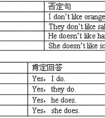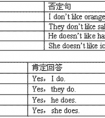He always _____TV in the evening. He _____ listening to the radio. [ ]A. watch, don't like B. watches, doesn't like C. watching, don't like D. watch, do-七年级英语
He shall come.他必须来。(shall有命令的意味。)
He will come.他要来。(will只与动词原形构成一般将来时。)
2)shall在疑问句中,用于第一,第三人称,征求对方意愿
shall I turn on the light?
要开灯吗?( 我把灯打开好吗?)
shall he come to see you?
他要不要来看你
(比较: will he come to see you? 他会不会来看你)
3)shall 用在陈述句,与第二第三人称连用,变为情态动词,表示允诺,命令,警告,和说话人的决心等。
should,would的用法:
1)should无词义,只是shall的过去形式,与动词原形构成过去将来时,只用于第一人称,例如:
I telephoned him yesterday to ask what I should do next week.
我昨天给他打电话,问他我下周干什么。
比较:
"What shall I do next week?" I asked.
"我下周干什么?"我问道。(可以说,shall变成直接引语时,变成了should。)
2)would也无词义,是will的过去形式,与动词原形构成过去将来时,用于第二、第三人称,例如:
He said he would come.他说他要来。
比较:
"I will go," he said. 他说:"我要去那儿。"
变成间接引语,就成了:
He said he would come.
原来的will变成would,go变成了come.。过去式从原来的go变为came。
be, do,have,他们没有词汇意义,只有语法作用,如协助构成进行体,完成体,被动态,否定句,疑问句等。
例如:
He is giving a lecture. 他在作报告
He has made a plan. 他已经订了计划
The small animals are kept in the cages. 小动物都关在笼子里。
助动词协助主要动词完成以下功用:
a. 表示时态,例如:
He is singing. 他在唱歌。
He has got married. 他已结婚。
b. 表示语态,例如:
He was sent to England. 他被派往英国。
c. 构成疑问句,例如:
Do you like college life? 你喜欢大学生活吗?
Did you study English before you came here? 你来这儿之前学过英语吗?
d. 与否定副词not合用,构成否定句,例如:
I don't like him. 我不喜欢他。
e. 加强语气,例如:
Do come to the party tomorrow evening. 明天晚上一定来参加晚会。
He did know that. 他的确知道那件事。
考点名称:一般现在时
- 一般现在时:
:表示通常性、规律性、习惯性的状态或者动作(有时间规律发生的事件)的一种时间状态。 - 一般现在时的具体用法:
1. 表示经常的或习惯性的动作,常与表示频率的时间状语连用。
e.g. I leave home for school at 7:00 every morning.
2. 表示客观事实和普遍真理。
e.g. The earth moves around the sun.
3. 表示现在发生的具体动作或存在的状态
e.g. He lives in Beijing now.
4. 习惯性的爱好或行为
e.g. I like dancing while she likes singing.
5. 表示预先计划或安排好的行为。
e.g. Our class begins at 7:45.
6. 在时间状语从句和条件状语从句中,常用一般现在时代替将来时。
e.g. If you come, we will wait for you.
7. 表示格言或警句中。
e.g. Pride goes before a fall. 骄者必败。
8.表示主语具备的性格、能力、特征和状态。
e.g. I don't want so much.
Ann Wang writes good English but does not speak well.
比较:Now I put the sugar in the cup.
I am doing my homework now.
9.在时间状语从句和条件状语从句中,常用一般现在时代替将来时。
10.小说故事用一般现在时代替一般过去时。新闻报道类的内容,为了体现其“新鲜”性,也用一般现在时来表示过去发生的事情。
11.有些表示状态和感觉的动词表示现在发生的具体行为时,只用一般现在时,而不用进行时态。
注意★:此用法如果出现在宾语从句中,即使主句是过去时,从句谓语也要用一般现在时。
例:Columbus proved that the earth is round.. 第一句用一般现在时,用于操作演示或指导说明的示范性动作,表示言行的瞬间动作。再如:Now watch me,I switch on the current and stand back. 第二句中的now是进行时的标志,表示正在进行的动作的客观状况,所以后句用一般现在时。 - 一般现在时与现在进行时的区别:
一、两种时态的主要含义:
一般现在时
1.表示事物的本质特性或客观存在,没有时限性。
The table ____ soft。(feels) 表特性特征。
Japan ___ in the east of China。 (lives) 表客观事实
2.现阶段经常性、习惯性的行为,可带频率时间。
The shop closes at 7:30 p.m.
Father doesn’t smoke. (习惯)
3.表说话时的状态,感觉或结果,一般用状态动词,如:
It doesn’t matter. Does it hurt? (感觉结果)
4.特殊用法:
-在条件、时间、让步从句中用现在时代替将来。
-If you go there,I’ll help you.
—用在begin,come,go,leave,return,open,close 等短暂谓语动词表规定计划。
The plane takes off at 11:30. (不受主观支配的计划)
-在剧本、解说、标题或there(here)开头的句中表进行
There goes the bell/Here comes Mr.Wang.
I declare the meeting opens.(正在宣布)
He meets the ball and hits back to No.2 (正在发生)
现在进行时
1.说话时正在发生,进行的动作
Look! Dark clouds are gathering . (正在发生)
2.表现阶段正在进行,但此刻不一定正在进行的事。
He usually gets up at 6:00,but this week he is getting up at 7:00.
(现阶段正在进行,但说话时不一定在起床)
3.现在进行时的特殊意义
-表示主观打算常用于 go,come,leave,start,begin 等,位移、趋向动词。
How long are you staying here (准备停留)
-表示眼前刚过去的语意即“话音刚落”,适用于tell,say,talk,discuss
You don’t believe it You know I’m telling the truth.
-表示安慰、关心、喜欢、讨厌等感情色彩。
He is always making noises in class. (讨厌)
-在条件、时间、让步状语从句中表示将来正在进行。
Don’t bother him if he is reading this time tomorrow.
二、严格区分进行时与一般时的语义
1. 持续动词的一般时表持续情况,经常性,习惯性行为或客观存在的事实,进行时表暂时性或有限时刻的持续。
2.短暂动词的一般时叙述事实,特征,能力而短暂动作进行时描述反复发生,即将发生或刚开始行为。
3.短暂动词和静态动词一般时表示实际情况客观状态、结果、特征、特性,进行时表未完成含开始或渐进之意。
The bus stops. (车停了-事实)
The bus is stopping. (渐渐停下来)
I love the job. (静态事实)
I am loving the job. ( 渐渐爱上了)
4.come,go,leave,start,return,move,reach,sail,fall 等一般时态表客观规定计划,进行时表主观打算推测。
Flight 254 leaves at 5:30. (表主观打算)
The plane is taking off an hour later.(主观判断)
5.现在进行时带always,often,usually,sometimes,等频率副词表感情色彩,一般现在时则没有此用法。 一般现在时的句子转换:
(1)当句子中有be动词或情态动词时,则把be动词或情态动词(can,could等等)提到主语的前面变成疑问句;在be动词或情态动词后面加not变成否定句.
例:
①陈述句:She is a student.
疑问句→ Is she a student?
否定句→ She is not a student.
②陈述句:I can swim.
疑问句→ Can you swim
否定句→ I can not swim.
(2)当句子中即没有be动词,也没有情态动词时,则在主语前加助动词do (you,以及复数),does(单数she,he,it)变成问句;
在主语后谓语动词前加助动词don’t(I,you,以及复数), doesn’t(单数she,he,it)变成否定句,助动词后的动词要变成动词原形。
例:
①陈述句:We get up at 7:00 every morning.
疑问句→Do you get up at 7:00 every morning?
否定句→We don’t get up at 7:00 every morning.
②陈述句:She has a little brother.
疑问句→ Does she have a little brother?
否定句→ She doesn’t have a little brother.一般现在时的表达方法:
主要通过谓语动词的变化和用时间词语来表示,其中最主要的是谓语动词的变化。现在一般时动词变化的规则是:
1.如果主语是名词复数和第一人称I、 we ,谓语动词不用做任何变化,即仍然用动词原形表示:
We usually go to school at 7:30. 我们通常7:30上学去。[go]
My parents give ten yuan to my sister every week.我父母每星期给我妹妹十元钱。[give]2.主语是任何一个单数名词或者是第三人称单数,谓语动词要进行必要的变化。特别提一点:不可数名词也算作单数处理。
3.谓语动词的变化规律是:
第三人称单数的构成见下表:


![How much does it ______ to fly from Yancheng to Hainan Island?[ ]A. cost B. payC. spend D. take-七年级英语](http://www.00-edu.com/d/file/ks/4/2/shiyidongci/2020-01-05/small7dcf2f05998de63e10cc3629787031c81578210087.png)

![He always _____TV in the evening. He _____ listening to the radio. [ ]A. watch, don't like B. watches, doesn't like C. watching, don't like D. watch, do-七年级英语](http://www.00-edu.com/d/file/ks/4/2/shiyidongci/2020-01-05/small45d599b4a60b84e61cec210bfbf051f51578214524.png)
![I'd rather ___ to the Mcdonald's Restaurant because I like to listen to quiet music.[ ]A. to go B. going C. go D. went-八年级英语](http://www.00-edu.com/d/file/ks/4/2/shiyidongci/2020-01-05/small1767bba1727fef2c035c53dcbd9bc20e1578209517.png)
